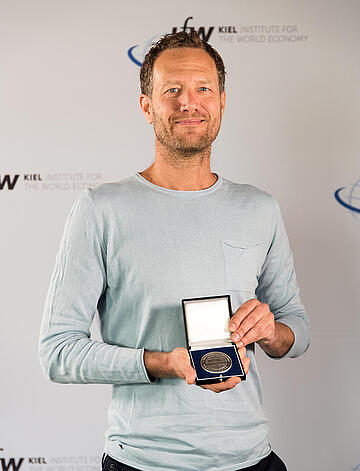Global Economy Prize Laureate 2018
Bas van Abel

Bas van Abel was born in Nijmegen on August 18, 1977.
From 1997 to 2002, he studied Interaction Design at HKU University of the Arts Utrecht and from 1999 to 2000, he completed a degree in Electrical Engineering and Programming at Delft University of Technology.
After completing his studies, Van Abel worked for the Waag Society—Institute for Art, Science and Technology, a Dutch foundation based in Amsterdam. It investigates new technologies, focusing on the artistic and cultural aspects associated with the development of new applications. Van Abel heads the foundation's Open Design Lab, which also includes FABLab Amsterdam, a manufacturing laboratory that provides open access to industrial means of production. He also established the world's first open source restaurant, which offers free access to its recipes, interior design ideas, and customer concepts. In the end he was Creative Director of the Foundation.
Van Abel came up with the idea of a fair-trade smartphone during a campaign for fair working conditions in the electronics industry. He feels that consumers have become ever more alienated from the reality of how their complex electronic devices are made and sees a lack of awareness about just how dispersed the global supply networks for those devices are, how many different raw materials are used, and the conditions under which those materials are obtained.
In 2010, Van Abel launched a campaign at the Waag Society on conflict materials in consumer electronics. The aim of the campaign was to draw attention to abuses in the production of electronic products, to make current production conditions and supply networks more transparent, and to identify alternatives. Van Abel noticed that although information is important, it does not in itself bring about change.
In 2013, Van Abel joined with Miquel Ballester and Tessa Wernink to found Fairphone B. V. Working together with six staff members, they set out to market a smartphone produced as far as possible using fair-trade principles. The primary goal was to bring about a rethinking on the part of industry and consumers and to create greater transparency. Due to the complexity of the product and the politically unstable situation in some countries where raw materials are mined, Van Abel doesn't believe that a 100 percent fair-trade smartphone is feasible just yet; rather, he sees it as a long-term goal.
Van Abel promoted his idea via crowdfunding. 25,000 customers ordered the first version of the Fairphone for EUR 325, netting the company over EUR 8 million. Fairphone is produced in as socially responsible a manner as possible, focusing on long service life, use of fair-trade materials and resources from conflict-free mines, decent working conditions, reusability and recycling as well as supply chain transparency.
The device was manufactured under license in China, with the company tasked with assembly making improvements to its working conditions specifically for the contract. In early 2014, an additional 35,000 units were manufactured and likewise sold out. Owing to difficulties with the license partners, Van Abel was unable to provide the intended spare parts and software updates for the first Fairphone.
Accordingly, Van Abel began planning a second model in 2014, this time as a product developed entirely in-house by Fairphone B. V. Institutional investors came on board and the Dutch government shouldered a major portion of the credit risk. At the end of 2015, the Fairphone 2 went on sale for EUR 525. Thanks to its modular design, individual parts, such as the display and housing, are user replaceable. To keep the device up to date with the latest technology, Van Abel offers extensions, including an improved camera, together with video tutorials on installation. The company now has more than 50 employees and reported sales of more than 100,000 Fairphones.
Over the coming years, Van Abel intends to further increase the number of Fairphone units produced in order to make them even more commercially viable, but also to put more pressure on improving the conditions associated with the production of smartphones and, if possible, to obtain all the required materials through fair-trade practices.
Van Abel's Fairphone idea has won numerous awards, including the United Nations Momentum of Change Award, presented at the World Climate Change Conference in Paris, as well as the German Environmental Award. Bas van Abel is currently CEO of Fairphone B.V. and lives in Amsterdam.